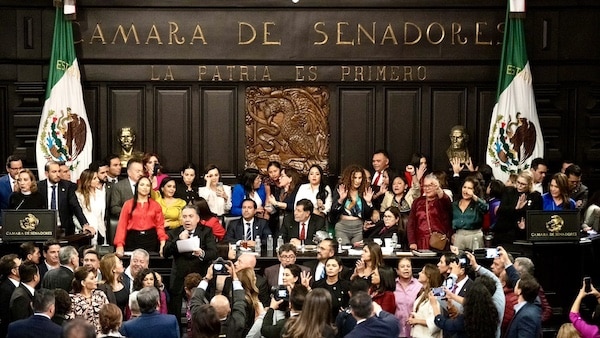In the early morning of September 11, Mexico’s Senate approved the Judicial Reform with 86 votes in favor and 41 against. The constitutional reform was achieved despite fierce opposition from business groups, high-ranking judges, foreign embassies, and right-wing law students. For its part, the Morena political party and its allies celebrate the victory as the victory of a popular mandate.
In its X Morena account, the ruling party celebrated this victory:
We have already approved the reform to the Judiciary! The legislators of our movement made history once again, fulfilling the popular mandate for which almost 36 million Mexicans voted. People of Mexico, we will never fail you.
The new Chief of Government of Mexico City, Carla Brugada said:
I recognize the senators who fulfilled the popular mandate and voted to approve the Judicial Reform that will allow the people to elect their judges, magistrates and ministers, and will make justice more accessible to all. Mexico is living historic moments of profound transformation and the Judiciary cannot be left behind. The people establish and the people remove.
In this way, the ruling party argues that the approval of the Reform should have been straightforward because Claudia Sheinbaum, who was elected president a few months ago, supported its approval, so tacitly the Mexican people voted indirectly for its approval.
The Reform was admitted to the legislature after intense negotiations between the Executive and three opposition senators who, until September 10, had not revealed whether they would vote for or against the constitutional reform. The approval of the project was achieved with just the necessary votes, not one more than required. 86 senators from Morena, the Labor Party (PT) and the Ecologist Green Party of Mexico (PVEM) voted in favor, while 41 legislators from the National Action Party (PAN), the Institutional Revolutionary Party (PRI) and the Citizen Movement (MC) voted against.
Opposition to the reform was fierce. There was a strike by thousands of judicial workers and protests by right-wing law students, as well as statements against the reform by the US and Canadian ambassadors that almost severely compromised diplomatic relations with Mexico. In addition, hundreds of demonstrators broke into the Senate on September 11, seeking to prevent the approval of the Reform at any cost. Due to the presence of the protesters in the legislative building, Senate President Jose Gerardo Fernandez had to declare an indefinite recess to protect the safety of the senators. Some of the protesters even managed to enter the Senate chamber by breaking the doors while waving Mexican flags and shouting “Traitors!” at the opposition senators who voted in favor of the Judicial Reform (with the attack on Senator Miguel Angel Yunes probably attracting the most media attention).
Opponents’ main criticism stems from the controversial election of more than 6,000 judges by popular vote, which they claim would politicize the judicial system and allow further infiltration of organized crime into the courts. For their part, Morena and its allies argue that this is the only truly democratic method of purging a corrupt system whose representatives have, in many cases, extremely high economic benefits. For her part, Mexico’s president-elect Claudia Sheinbaum wrote:
With the election of judges, magistrates, and ministers, the administration of justice in our country will be strengthened. The regime of corruption and privilege is becoming a thing of the past and a true democracy and rule of law will be built. “Demos” means people, “krátos” [means] power. The power of the people.
For now, it seems that the most difficult part of the approval of the Reform has already passed. However, according to Mexico’s federative political organization, the reform will now have to be approved by the congresses of the 32 states of the nation. Already the congresses of Oaxaca and Veracruz have approved the reform, and the judicial reform gets even closer to reality.

